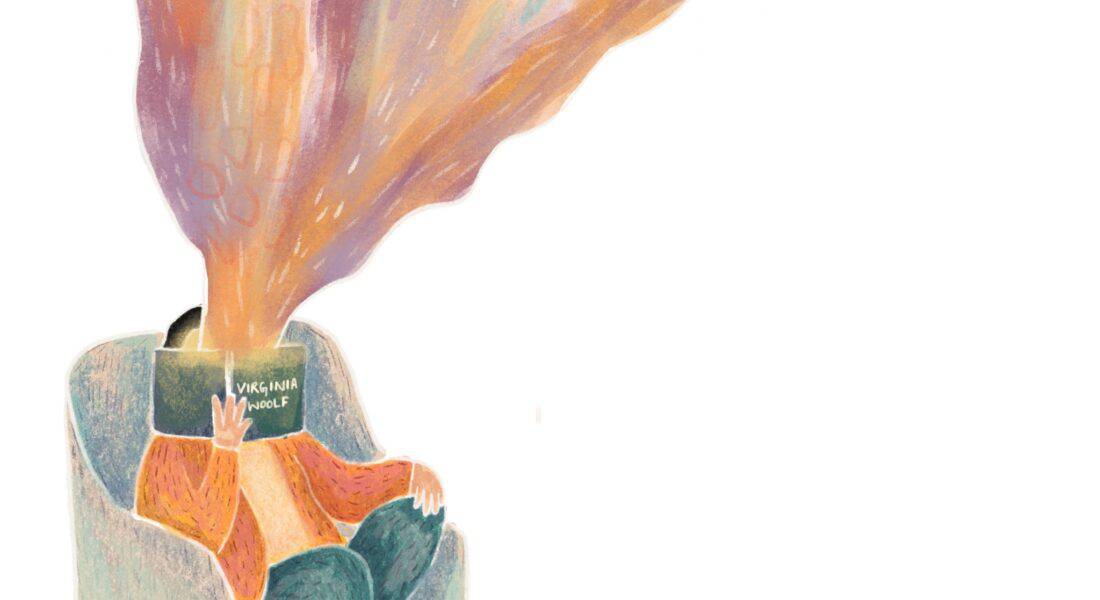
Being an avid reader most of my life, I’ve always found solace in the world of books. Whenever I found it difficult to occupy space (literally and figuratively), I turned to stories. Interestingly enough, the protagonist in most fiction novels is usually a person who is looking for a way home, is searching for meaning in a meaningless space, or is simply trying to navigate the absurdities of everyday life. My experience with reading has also allowed me to question reality, the universal truths of society, and the general norms we’re expected to live by. Naturally, I feel I was destined to come across Virginia Woolf’s work someday or the other.
Woolf is considered to be one of the most influential writers of classical literature and is admired for her deep sense of observation around themes of self-advocacy, social justice, and the nature of societal norms. My work as a therapist also has been greatly impacted by Woolf’s writings. Throughout her literary career, there was a particular sense of sadness that she lived with, the kind of sadness that screamed for wanting to be understood and to feel belongingness in an unequal world. She wanted to capture the essence of life through a literary method of writing called “Stream of Consciousness” which essentially was a style of writing that promoted making space for all the random thoughts inside our brains, without any filters (maybe overthinking isn’t all that bad!)
I discovered Woolf’s writing whilst making sense of my own identity as a woman, and somewhere along the way, it also helped me make sense of myself as a therapist. Here’s how–
1. Holding space for anger:
My work as a therapist isn’t all glamorous and perfect as they tend to represent in the media. I have often felt helpless in the therapy space listening to stories of social injustices, sexual violence, and gender inequality from clients who have encountered these situations in their lives. With this helplessness, I also feel anger toward the systems that have brought suffering to my client’s lives. Reading Woolf’s work allowed me to see that anger– both mine and my clients’– was an acceptable emotion that didn’t simply need to be ‘managed’. Growing up in a collectivist culture often socialises us into suppressing our expression of anger. Moreover, historically, marginalisation of groups has been sustained through the suppression of anger among minority communities. But Woolf’s work where she relevantly validates and holds space for anger through her writing– allowed me to do so for my clients as well.
2. Understanding our relationship with money:
While talking about family, college, workplace or other institutions my clients are a part of, the conversation often leads to instances of not feeling seen or recognised enough. When clients unpack these beliefs further, we find themes of power imbalance, inequality and marginalisation. Interestingly, I found myself feeling uncomfortable with these conversations, mostly because of how deeply embedded it is to avoid talking about our relationship with money. It struck a chord within me when I read how much Woolf emphasised the role of money in the lives of women. She speaks about how to truly live with a sense of agency, it’s imperative to build a relationship with money and to dig deeper into aspects of shame, vulnerability and helplessness around the ownership of money. And so, the more I became open to the idea of delving deeper into how my clients perceived money, the more I realised how a lot of us may derive our sense of agency through learning how to manage our finances and how intricately that impacts our mental health. This has allowed me to have those uncomfortable conversations with my clients about their belief systems around money– and as a result, uncover and work through them.
3. To dream of a room of one’s own:
Many people come into therapy feeling like they don’t belong in the world, that their identities are nothing beyond their working hours, their commute or the general social interactions they get to make in their everyday life. This sense of monotony and tediousness is bound to enter the space of therapy, as it usually does with my clients. It can be quite hard to make sense of this nothingness, this randomness that humans are supposed to live with, on a daily basis, whilst trying to be on top of everything that is expected of them. As I found myself feeling stuck in these spaces, I discovered that my clients also experience a sense of stagnation which they are unable to really comprehend. This shared experience of the weirdness, fragility and uniqueness of our human minds has helped me and my clients travel to the farthest of unexplored existential concerns in their life– the dilemma of whether they will ever feel truly belonged, or if life will ever really make sense, or whether they’ll ever be able to feel fully authentic. While these questions have no direct answers, Woolf’s writings have helped my clients and I to acknowledge the uncertainty and impermeable nature of living and have enabled me to help facilitate a space in therapy, where clients can build a home within themselves– a home built out of loving memories, dreams, preferences, favourite movies, art and everything in between and to create their own ways of belonging in the world. Creating a room of one’s own in the world may feel like a herculean task, but I’m glad that Woolf’s gifts of hope and imagination got seeped into the therapy space where I too spend much of my time, and feel like I belong.
I’m forever indebted to Virginia Woolf for impacting my work as a therapist, for validating mine and my clients’ lived experiences and for leaving behind an abundance of stories and existential dilemmas, for us to ponder upon!

